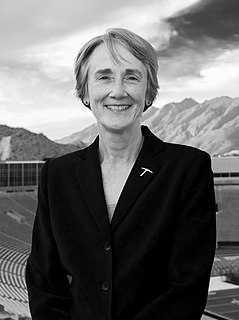A Quote by George Wald
There was a golden period that I look back upon with great regret, in which the cheapest of experimental animals were medical students. Graduate students were even better. In the old days, if you offered a graduate student a thiamine-deficient diet, he gladly went on it, for that was the only way he could eat. Science is getting to be more and more difficult.
Related Quotes
Communism wasn't a word that I thought of when I went to Cuba. The original Fidelistas were not Communists. They were graduate students at the university and law students. After the Fidelistas took over, they went to Washington and tried to get support from the U.S. government, which turned them down. They were in a desperate political and economic situation, so they took the offer from the Soviet Union. Communism was a matter of necessity.
Science itself is badly in need of integration and unification. The tendency is more and more the other way ... Only the graduate student, poor beast of burden that he is, can be expected to know a little of each. As the number of physicists increases, each specialty becomes more self-sustaining and self-contained. Such Balkanization carries physics, and indeed, every science further away, from natural philosophy, which, intellectually, is the meaning and goal of science.
The obsessive focus on a college degree has served neither taxpayers nor students well. Only 35 percent of students starting a four-year degree program will graduate within four years, and less than 60 percent will graduate within six years. Students who haven't graduated within six years probably never will.
There's still sexism in the world, so there's still sexism in publishing and in graduate school. But it is different. Now, it's more coded and harder to detect. It was more explicit when I was in school. There were no rules against male professors asking out female students. The reverse didn't happen since female professors were rare or nonexistent. Visiting writers came, 90% of them male, and some expected that a female student would materialize as his date for the visit.
Unlike many graduate fellowships, the Rhodes seeks leaders who will 'fight the world's fight.' They must be more than mere bookworms. We are looking for students who wonder, students who are reading widely, students of passion who are driven to make a difference in the lives of those around them and in the broader world.
People who graduate are more resilient financially, and they weather economic downturns better than people who don't graduate. And, throughout their lives, people who graduate are more likely to be economically secure, more likely to be healthy, and more likely to live longer. Face it: A college degree puts a lot in your corner.





































